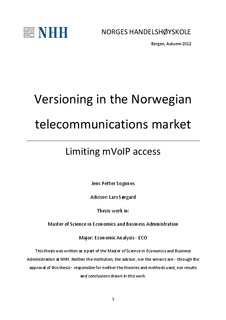Versioning in the Norwegian telecommunications market : limiting mVoIP access
Abstract
If a company is unable to distinguish individual consumers by observable characteristics, but has some aggregate knowledge regarding unobservable consumer characteristics, versioning might be a successful pricing strategy. This thesis takes an in-depth look into different forms of versioning theory to gain a richer understanding of the theories’ underlying mechanisms. The theory is then used to construct a model of consumer demand for mobile phone subscriptions with internet access. The purpose is to figure out whether it would be profitable for Telenor to attempt a versioning strategy where two distinct quality versions of mobile phone subscriptions are offered: one with mVoIP access, and one without mVoIP access.
The Benchmark Monopolist model shows that versioning is potentially profitable in a monopolist setting depending on the implementation cost. The profitability of versioning is driven by a market expansion effect. When a new low-quality product version is introduced, new customers with low willingness to pay for quality are included in the market. Limiting mVoIP access will also help to diminish the cannibalization of telephony services.
In a competitive setting, the success of versioning is conditioned on the ability of the market actors to cooperate. If all telecom companies in the market implement a versioning strategy, they are all better off. However, incentives to deviate from cooperation complicates the prospects of reaching a stable versioning equilibrium in a market with intense price competition. Strong and clear signaling and the threat of retaliation are necessary to hold market actors in line.
